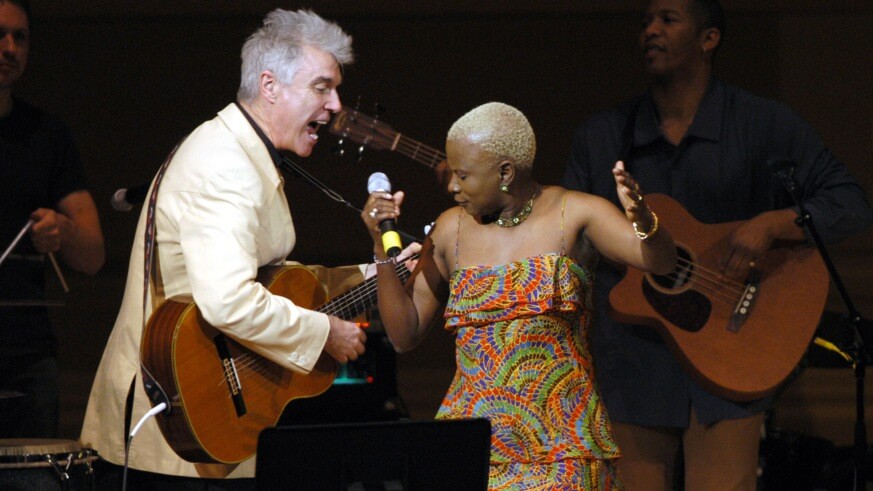Before David Byrne headlines at Camden’s BB&T Pavilion as part of WXPN’s 25th annual XPoNential Music Festival this weekend (July 27-29), know this: Byrne is elusive. At a time when social media necessitates (demands, even) constant contact with the public and product placement as a crucial aspect of that intrapersonal arrangement, Byrne – Talking Heads co-founder and a godfather of squawking angular punk, then funk, then Afro-Brazilian music and so on – the solo artist has been away.
Not away away. He made a film about color guard formations (“Contemporary Color”), wrote and staged theater musicals such as his disco opera about Imelda Marcos (“Here Lies Love”) and Joan of Arc (“Into the Fire”). He’s appeared on records by De La Soul and St. Vincent. But, Byrne has had no solo album to speak of for fourteen years, and wouldn’t speak to me on the occasion of his XPoNential gig.
Fourteen years is a long time between drinks. Luckily, Byrne released “American Utopia,” in 2018, a magically crisp and beautiful record, produced and written with Brian Eno, Talking Heads’ principle collaborator on their earth-shattering, African-inspired, “Remain in Light” album of 1980. And “American Utopia” features their patented brand of twitchy funk guitars, snake-rattling rhythms, squawky vocals, Afro-Cuban grooves, uneasily identifiable ambience, and stories of chickens, dogs, gasoline, gods, dirty sheets, laughter and dancing. So nothing has changed and everything has changed.
“I think we see a lot of things masquerading as their reverse: shopping marketed as freedom, meaningless mountains of data offered to us as knowledge,” Byrne told this very writer in 2002. “And we see identical movies and products being offered to us as a choice. Most of all, we see conformity being marketed as individuality. My attacks are humorous in that they swipe at sacred cows such as Charity and Hope. My attacks are also serious, but over the top and twisted as well. So even I don’t know when to take them seriously. But I do believe there is something there, that under the humor there is serious criticism.”
Angelique Kidjo talks David Byrne

Fortunately, who will speak for Byrne, in the present, is the world renowned goddess of Afro pop, Angelique Kidjo whose newest album, “Remain in Light” is an epically euphoric, sultrier and doubly funky version of the Byrne-Eno-Talking Heads classic of the same name. Not only is her version of “Remain in Light” one of this year’s critically-acclaimed best albums, Kidjo will play NYC’s Summerstage at Central Park on September 27 with music exclusively from that new record.
Before creating her re-imagined “Remain in Light,” Kidjo thought highly of Byrne. “He was the first artist who came to see my U.S. concert at SoB’s in 1992, so I followed his work through the years. With Peter Gabriel and Paul Simon he is one of the mainstream artists who put African music on the forefront in the 80’s and 90s.” When Talking Heads recorded its “Naked” album in 1987 in Paris – a time when Kidjo was living in the City of Light – the African music scene there was as prominent as hearing Byrne’s music. “Talking Heads music was part of my life.. my front of house engineer would play their song “Blind” for many years to tune the PA before every concert,” she said.
Kidjos decision to re-make and re-model “Remain in Light” – to be different from Talking Heads’ first shot at it – was based on her wish to bring Byrne’s idea of African music “back to Africa to show the power and transcendence of our culture,” she said. “Much of the music we’re listening today has its roots in Africa. We need this strength and power today in the world we’re living. There is no doubt about it. Africa, as a continent, has suffered more than any other but never lost its resilience and energy. Everything is in the title in a way. reinventing this album was my way of “remaining in light” and not being brought down by discouragement and despair.”
When Kerry James Marshall – the painter behind the artwork of Kidjo’s “Remain in Light” – heard her album, he noticed that her version was about affirmation and positivity, while Byrne’s lyrics were focused on doubt and anguish. Considering the time (1980) of its initial release – of money hungry Reaganomics, of AIDS, of people’s rights being cast aside – what connection did the wise Kidjo see between the past and current political climate in capturing “Remain in Light” now?
“As we were working on the album, new meanings were appearing in the cryptic lyrics. With the help of the Beninese proverbs included in the songs, Byrne’s original lyrics turned into a kind of prophecy describing our crazy world today. Songs such as “Born Under Punches” became the perfect commentary on the immense corruption eating our societies now.”




























